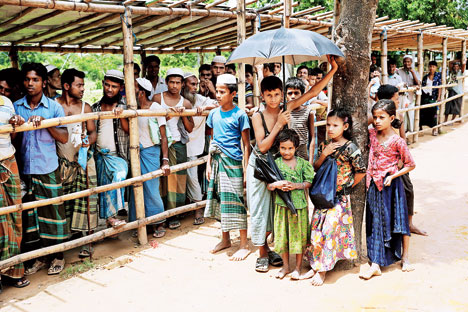
Mesbah Kamal, secretary-general of the National Coalition for Indigenous People in Bangladesh, has said in an interview that the Rohingya refugees should not return to Myanmar till "a favourable atmosphere" is created.
Kamal, a professor, said India should prod Saarc into coordinating with Asean, to which Myanmar belongs, to help resolve the crisis.
The National Coalition responds to the needs of the tribal population in Bangladesh. It looks after their economic well-being and ensures they are not disturbed by the mainstream.
People living in the Chittagong Hill Tracts also come under its purview and receive its support. Although not a government organisation, the National Coalition cooperates with the government in protecting the rights of the indigenous people.

Q: With Myanmar imposing one precondition after another and the Rohingya refugees not keen to return, do you see a glimmer of hope anywhere?
Kamal: Myanmar authorities are demanding identify proof and identity cards from refugees who have lost everything. When they were escaping from a terrible, hell-like situation, when they were trying to avert annihilation, could they have brought identity cards with them? This is a cruel joke being played on them.
If, for argument's sake, we say that a small section of the refugees do have identity proof, they too are unwilling to go back because they don't want to become victims of another carnage.
The refugees' demand is clear and simple. They want a habitable atmosphere in their homeland. They want to live with honour and dignity and, most important, they demand citizenship. Unless these preconditions are met, they are not going to return. Period.
Q: Would you describe the merciless assault on the Rohingya as "ethnic cleansing"?
Kamal: Whatever has happened in the Arakan region is nothing but ethnic cleansing. Village after village was burnt, women were indiscriminately raped, and male members of families were hacked to death. At least one woman from each family was raped.
The women are not disclosing the truth out of shame, though they need not feel ashamed at all. Criminal shame should be the reaction of the Myanmar regime, army and hooligans.
I shall give you one specific example. A child who had managed to escape with her aunt had this to say: "We were all fast asleep when the bomb attack began. My parents and my seven brothers and sisters were instantly killed. I was severely burnt, but somehow I could escape with my aunt."
Tell me, where and how would these two people secure their identity proof? It is not at all surprising that women and children constitute the majority of the refugees. The men were taken care of by the attackers.
Q: The Rohingya racial identity has given rise to some queries. One question being asked is, "to what extent are they Bengalis"? Incidentally, the great Bengali poet, Syed Alawol, hailed from the Arakan.
Kamal: If we try to go to the very roots, we have to admit they are Bengalis. Of course, they have been influenced to some degree by the life pattern of the (Myanmarese) majority. But even after this, they have remained primarily Bengalis and Muslims. They emerged from the same racial stock. And the poet Syed Alawol is the most powerful example of this racial togetherness.
Q: Is the ISI trying to turn the persecuted Rohingya into terrorists? The Indian government has raised this issue.
Kamal: There are about 40,000 Rohingya refugees in India and 11 lakh in Bangladesh. They are extremely vulnerable and I won't be surprised if the ISI tries to brainwash and lure them.
Since the emergence of Bangladesh in 1971, the ISI and terrorists backed by it have tried in all sorts of ways to destabilise Bangladesh. Hence, it is expected - with an eye on their record - that they would try to create mischief in this sphere as well.
Q: What role can India play to defuse the crisis?
Kamal: As the largest member country of Saarc, India could prevail over the other members to work out a just settlement. Myanmar, on the other hand, is a member of Asean, and there's no reason these two regional blocs should not cooperate to end this problem.
Indeed, not only Asean and Saarc but also countries like China and Japan should chip in. As we all know, the "boat people" - Rohingya refugees - have landed up in Thailand, Malaysia and Indonesia as well.
You see, the world has turned into a global village, and this interdependent global village should try to seek a solution to this crisis.
Q: The UN has expressed dismay and its representatives have visited the refugee camps and called for a "political accommodation".... In fact, UN secretary-general António Guterres and World Bank president Jim Yong Kim are now in Bangladesh....
Kamal: The UN has till now done whatever it could, but it's handicapped by its inherent limitations. It cannot find or work out a political solution; that is why it is appealing to countries. It has described this saga as the most cruel and merciless in recent history.
I would like to end by saying the Rohingya will not return unless a favourable atmosphere has been created. Had I been in their place, I would have stuck to the refugee camps.










